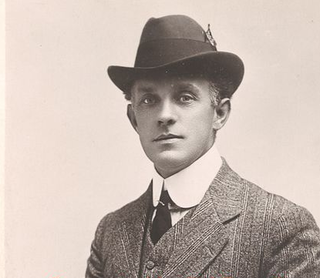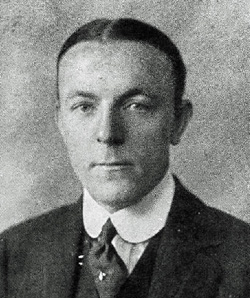
James Francis Cagney Jr. was an American actor and dancer, both on stage and in film. Known for his consistently energetic performances, distinctive vocal style, and deadpan comic timing, he won acclaim and major awards for a wide variety of performances. He is best remembered for playing multifaceted tough guys in films such as The Public Enemy (1931), Taxi! (1932), Angels with Dirty Faces (1938), and White Heat (1949), finding himself typecast or limited by this reputation earlier in his career. In 1999, the American Film Institute ranked him eighth among its list of greatest male stars of the Golden Age of Hollywood. Orson Welles said of Cagney, "[he was] maybe the greatest actor who ever appeared in front of a camera". Stanley Kubrick considered him to be one of the best actors in history.
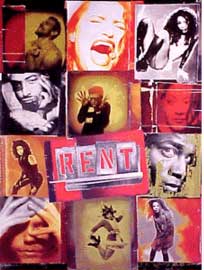
Rent is a rock musical with music, lyrics, and book by Jonathan Larson, loosely based on Giacomo Puccini's opera La bohème. It tells the story of a group of impoverished young artists struggling to survive and create a life in Lower Manhattan's East Village in the thriving days of Bohemian Alphabet City, under the shadow of HIV/AIDS.

Jean Marie Lucien Pierre Anouilh was a French dramatist whose career spanned five decades. Though his work ranged from high drama to absurdist farce, Anouilh is best known for his 1944 play Antigone, an adaptation of Sophocles' classical drama, that was seen as an attack on Marshal Pétain's Vichy government. One of France's most prolific writers after World War II, much of Anouilh's work deals with themes of maintaining integrity in a world of moral compromise.

Édith Piaf was a French vocalist, songwriter, cabaret performer and film actress noted as France's national chanteuse and one of the country's most widely known international stars.

Sir Henry Maximilian "Max" Beerbohm was an English essayist, parodist, and caricaturist under the signature Max. He first became known in the 1890s as a dandy and a humorist. He was the drama critic for the Saturday Review from 1898 until 1910, when he relocated to Rapallo, Italy. In his later years he was popular for his occasional radio broadcasts. Among his best-known works is his only novel, Zuleika Dobson, published in 1911. His caricatures, drawn usually in pen or pencil with muted watercolour tinting, are in many public collections.

The Directory or Directorate was a five-member committee which governed France from 2 November 1795, when it replaced the Committee of Public Safety, until 9 November 1799, when it was overthrown by Napoleon Bonaparte in the Coup of 18 Brumaire, and replaced by the French Consulate. It gave its name to the final four years of the French Revolution.

Arthur Christopher Orme Plummer is a Canadian actor whose career has spanned six decades, beginning with his film debut in Stage Struck (1958).

A top hat, beaver hat, high hat, silk hat, cylinder hat, chimney pot hat or stove pipe hat, sometimes also known by the nickname "topper", is a tall, flat-crowned, broad-brimmed hat, worn by men from the latter part of the 18th to the middle of the 20th century. By the end of World War II, it had become a rarity in ordinary dress, though it continued to be worn in specific instances, such as state funerals, also by those occupying prominent positions in the Bank of England, by certain City stock exchange officials and occasionally when passing between the Law Courts and Lincoln's Inn, London by judges of the Chancery Division and Queen's Counsel.

William Thomson Hay was an English comedian, actor, author, film director and amateur astronomer who came to notice for his theatrical sketch as a jocular schoolmaster, known as Dr. Muffin. The acts in which Hay performed the schoolmaster sketch became known as "The Fourth Form at St. Michael's". Hay toured with the act and appeared in the United States, Canada, Australia and South Africa. He famously performed the schoolmaster routine at the 1925 Royal Command Performance before King George V and Queen Mary. From 1934 to 1943, he was a prolific film star in Britain and was ranked the third highest grossing star at the British Box Office in 1938, behind George Formby and Gracie Fields. He is widely regarded as one of the most prolific and influential British comedians of all-time.
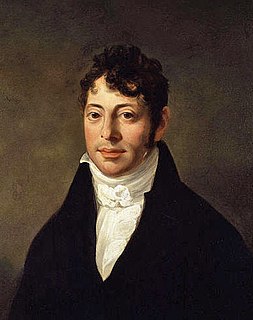
Joseph Grimaldi was an English actor, comedian and dancer, who became the most popular English entertainer of the Regency era. In the early 1800s, he expanded the role of Clown in the harlequinade that formed part of British pantomimes, notably at the Theatre Royal, Drury Lane and the Sadler's Wells and Covent Garden theatres. He became so dominant on the London comic stage that the harlequinade role of Clown became known as "Joey", and both the nickname and Grimaldi's whiteface make-up design were, and still are, used by other types of clowns. Grimaldi originated catchphrases such as "Here we are again!", which continue to feature in modern pantomimes.

Sébastien Tellier is a French Musician, singer, songwriter and multi-instrumentalist. He is currently signed to Record Makers, a French independent record label. He sings in English, French and Italian.

Les Indes galantesOpéra-ballet with a prologue and two entrées. Choreography: Louis Dupré. Music: Jean-Philippe Rameau. Libretto: Louis Fuzelier. Sets: Giovanni-Niccolò Servandoni. First performance: 23 August 1735, Théâtre de l'Académie de Musique, Paris. Principals: David Dumoulin, Louis Dupré, M. le Breton, M. Javellier, Marie Sallé.

Our Miss Gibbs is an Edwardian musical comedy in two acts by 'Cryptos' and James T. Tanner, with lyrics by Adrian Ross and Percy Greenbank, music by Ivan Caryll and Lionel Monckton. Produced by George Edwardes, it opened at the Gaiety Theatre in London on 23 January 1909 and ran for an extremely successful 636 performances. It starred Gertie Millar, Edmund Payne and George Grossmith, Jr. The young Gladys Cooper played the small role of Lady Connie.
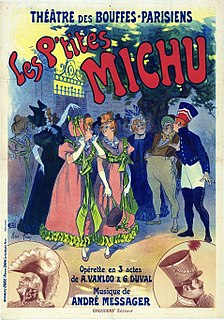
Les p'tites Michu is an opérette in three acts, with music by André Messager and words by Albert Vanloo and Georges Duval. The piece is set in Paris in the years following the French Revolution and depicts the complications ensuing after the identities of two girls become confused in their infancy.

La vie parisienne is an opéra bouffe, or operetta, composed by Jacques Offenbach, with a libretto by Henri Meilhac and Ludovic Halévy.

Robert Emmett O'Connor was an American film actor. He appeared in 204 films between 1919 and 1950. He is probably best known as the warmhearted bootlegger Paddy Ryan in The Public Enemy (1931) and as Detective Sergeant Henderson pursuing the Marx Brothers in A Night at the Opera (1935). He also appeared as Jonesy, in Billy Wilder's 1950 film Sunset Boulevard. He also made an appearance at the very beginning and very end of the Metro-Goldwyn-Mayer cartoon short Who Killed Who? (1943).
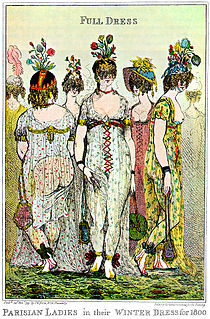
The Incroyables and their female counterparts, the Merveilleuses, were members of a fashionable aristocratic subculture in Paris during the French Directory (1795–1799). Whether as catharsis or in a need to reconnect with other survivors of the Reign of Terror, they greeted the new regime with an outbreak of luxury, decadence, and even silliness. They held hundreds of balls and started fashion trends in clothing and mannerisms that today seem exaggerated, affected, or even effete. Some devotees of the trend preferred to be called "incoyable" or "meveilleuse", thus avoiding the letter R, as in "révolution." When this period ended, society took a more sober and modest turn.
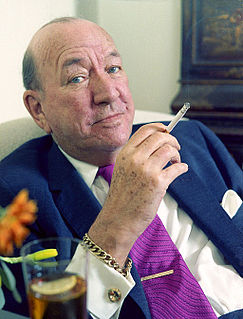
Sir Noël Peirce Coward was an English playwright, composer, director, actor and singer, known for his wit, flamboyance, and what Time magazine called "a sense of personal style, a combination of cheek and chic, pose and poise".

Robert Latham Jeffrey was a Canadian singer, actor, director, producer and writer. He was known for his tenor range and lively interpretations for concert and musical stage.








